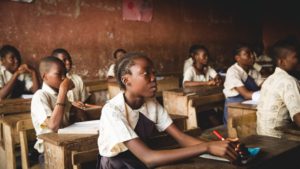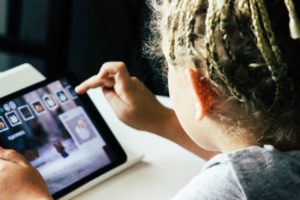Africa, which counts 11 of the 20 most rapidly growing countries in the world, is a fast-moving continent. Huge progresses were accomplished over the past decades: life expectancy at birth, for example, increased by nearly 10 years between 2000 and 2015. And whereas most countries still face major challenges to fulfill their people’s basic needs, some technologies are already widespread. Indeed, Africa benefits from a huge mobile phone penetration rate, across the continent: almost 50% of the population owns a mobile phone and this rate is up to 67% in Gabon in 2017. Hence, many entrepreneurs take this opportunity to create new businesses and tackle social issues with innovative solutions.
Hereafter the immediate reduction of poverty, the use of mobile phones has middle/long-term effects on society, enabling a durable growth for the masses. As an illustration, we will focus on banking, health and education, 3 overarching engines for sustainable growth.

Mobile phones as financial means
The most impressive success story is M-PESA’s, which is the continent’s most recognized example of technological leapfrogging. With its solution, Africans went from lacking bank accounts and traditional banking infrastructures, to having a widespread mobile money service : the most basic cellphones are now used as money-transfer devices.
M-Pesa was launched in 2007 by Safaricom, a Kenyan telecom company. It allows every user to store money in one of its agent stand – 4,000 in 2007, more than 94,000 in 2016 – and then exchange it thanks to a SMS-technology. The success was immediate. It is widely used by the bottom of the pyramid, for their daily needs. Today, with 18M active users in Kenya, it represents 60% of all the country’s money transactions but only 1% of the monetary mass. And, according to a MIT study, it amazingly helped 2% of Kenyan households to leave extreme poverty since 2008. Tavneet Suri, a MIT researcher, showed that access to mobile-money services allowed Kenyans to save more money and weather financial storms (by increasing daily per capita consumption levels), especially among female-headed households.
M-Pesa showcases initiatives in the banking sector. Yet many other projects are worth being studied, as they are changing our conceptions sectors such as education and health.

Online education to deliver university diplomas
With almost half of its population under 19, Africa is facing huge challenges for education. Some progresses have been made, especially in primary education, but with almost 150M more people needing education in the next 5 years, a change in teaching methods is unavoidable. Indeed, most countries already lack school infrastructures and with this growing need of education, the follow-up of teaching quality is compromised. Yet while education is still perceived as a privilege in many countries, many initiatives aim to prevent those inequalities.
One major trend is the digitalization of educative contents: e-learning platforms, educative tablets, digital cursus etc. Qelasy, an Ivorian company, created an educative tablet for students. It is already used in more than 200 schools in various African countries and is resistant to heat, dust, humidity. It allows children to access their course materials, daily exercises and to follow their progression.
Chalkboard Education is a symbol of the phenomenon. It allows students to download textbooks, exercises, tests and to be in permanent contact with teachers through their phone, even without an internet connection instead of going to an overcrowded class. It is already partnering with universities in Ghana to enable people to study wherever they are, bypassing infrastructures and expansive connection costs problems.
New tools to prevent the shortage of doctors
The health sector is facing similar problems: lack of infrastructure (hospitals, usable roads) and doctors. According to the WHO, Africa has 24% of the world’s illnesses but only 3% of health professional with, for example, only 0,3 doctors for 1000 inhabitants in Ethiopia. Hence, the use of mobile phones can easily help remote populations to receive more efficient treatments. Initiatives are numerous, and mobile phones are becoming legitimate tools for healthcare.
Here are three examples of promising projects. HelloDoctor, available in 10 African countries, provides free essential daily healthcare advice and enables everyone to talk with doctors at any time. Peek Vision gives access to ophthalmologic care and created a smartphone camera adapter, that helps taking retinal images in order to diagnose vision problems. Finally, Vula Mobile allows primary healthcare workers to take and share results with on-call specialists, so as to get their patients quick and efficient specialist care. It is used by more than 3,600 health workers in South Africa, especially in remote areas. These health workers have helped almost 6,000 patients in 2017, on ophthalmological, cardiological, orthopedics or burn-related treatments. Thanks to these services, there is no need for doctors to be physically present or even in the same country to cure people, which is a massive revolution for the traditional health sector.
Although these initiatives alone will not make Africa catch up on its delay in development, the massive adoption of mobile phones is a real opportunity for the continent to create its own growth model.



Lecture très intéressante, bravo ! Chalkboard n’est pas la seule à avoir compris le potentiel de la révolution digitale en Afrique puisque même les instit européens s’y engoufrent : https://business.lesechos.fr/entrepreneurs/financer-sa-creation/afrique-partech-lance-un-fonds-de-100-millions-d-euros-pour-soutenir-les-startup-317920.php